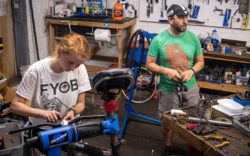The COVID-19 pandemic is reaching the one-year mark in the United States, and for small business owners that could mean taking out a Paycheck Protection Program loan for the first or second time.
PPP loans were provided by the U.S. Small Business Administration to help small businesses keep their workforce employed and to support ongoing operations. Small businesses, self-employed workers, sole proprietors, certain nonprofit organizations and tribal businesses qualify for the loan with a chance of loan forgiveness if certain requirements are met.
Leslie Hale, the executive director of nonprofit organization Books for Keeps, said the PPP loans have provided guaranteed stability. “We don’t have a regular retail operation that was shut down or a restaurant operation that was shut down. However, we had fundraisers disrupted; we saw giving become erratic in a lot of ways,” Hale said. “Securing PPP loans in round one, and now round two, allowed us to actually ensure that our program could continue.”
With the PPP loans, Books for Keeps was able to bring on two part-time workers in their book fulfillment warehouse to deliver 68,000 books to students in Athens and the surrounding communities, Hale said.
For Mimi Maumus, the chef and owner of Home.made, the experience with the first round of PPP loans was not as successful. “You know, I understand that the government was trying to do something quickly and a one-size-fits-all, but it certainly did not fit my industry, because the majority of it was required to get a payroll, and I had furloughed 85% of my staff,” Maumus said. “And then the other huge percentage was to go to utilities, and what I really needed was money for things like the cost of goods.”
The application for the second draw of PPP loans for small businesses and nonprofits with fewer than 20 employees began Feb. 24 and ran through Mar. 9. Maumus said she has more hope in the second round of loans making a difference due to the inclusion of renovations.
“For us, that money will go towards things like pursuing an outdoor seating area… We’re trying to survive on curbside, and that’s not really our food style, and it’s a huge change for us,” Maumus said. “This is the first time in the pandemic that I have felt any sort of traction as a restaurant owner, like, ‘Oh now there’s something I feel like I can actually do to give us a fighting chance.’ So this, the second PPP, is two thumbs up for me.”
Martin Gervias, an economics professor in the Terry College of Business, said he believes the program has been only somewhat successful in Athens due to the confusion surrounding the program and the speed with which it was created. “Those who knew how to proceed or knew where to ask were successful; whereas those who didn’t didn’t get access to these loans at all probably suffered as a result,” he said.
Gervais also said he believes that a lot of the confusion came down to the information not being well advertised and disseminated in the best possible way. To combat that, David Bradley, CEO of the Athens Chamber of Commerce, worked with the Georgia Business Alliance and the Office of Economic Development to spread information about PPP.
“We did get out a couple letters, postcards and emails to every business in Athens that sort of describes both SBA economic injury disaster loans and the grants that were available as well as the PPP,” Bradley said. “And so we really made an effort to try to get the word out to everybody that we possibly could.”
The first round was available to employers with fewer than 500 employees, and a lot of fairly large local companies received sizable PPP loans. According to a ProPublica database of coronavirus bailouts, student housing developer Landmark Properties and Athens Orthopedic Clinic received the largest loan amounts in Athens—about $5 million each. President Joe Biden has limited the second round to smaller businesses.
PPP loan applications require relationships with a bank or lender, which proved to be a problem for some Athens businesses. Bradley said the Athens Area Chamber of Commerce helped businesses that didn’t have a relationship with a local bank or were dealing with an internet-based bank. They put those businesses through a short vetting process and ended up making 60 or 70 connections between local businesses and banks, which translated into $4 million to $5 million, Bradley said.
“Unfortunately, I think that in other areas where they didn’t have access to resources that were helping, whether it was a community bank, or a [Athens Area] Community Foundation, answering questions about it,” Hale said. “I think that smaller businesses and nonprofits, unfortunately, were left out.”
Bradley called helping Athen’s businesses navigate the PPP application process heartbreaking because there were a lot of businesses that didn’t meet the criteria to receive the loan. But while the process was disheartening, it was also “energizing.”
“At no time in the history of this country, and probably this world—and I don’t mean that lightly—there has never been so much fiscal assistance provided to try to keep people employed,” Bradley said. “Some of the thank yous that we received in just trying to help connect people together just made you cry. We were just a connector. We weren’t the reason people cried. The reason people cried is that they were able to get connected to folks that would provide PPP.”
Like what you just read? Support Flagpole by making a donation today. Every dollar you give helps fund our ongoing mission to provide Athens with quality, independent journalism.










